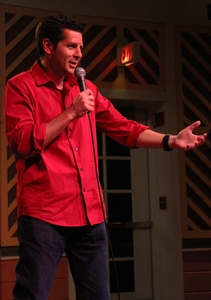HC Dems battle “Islamophobia” with comedy
by Daniel O'Kelly '14
ARTS AND ENTERTAINMENT WRITER
Most people are only exposed to the likes of Jerry Seinfeld, Will Ferrell and Dane Cook, comedians whose humor, at times, seems merely crude and aimless. Comedian Dean Obeidallah includes a small share of such jokes in his act, but he tends to emphasize the role of Muslims in the United States (or as he called them in his routine last Tuesday night in the Fillius Events Barn, “pork free Americans”) and playfully highlight the extent to which certain Muslim and Arab stereotypes have been ingrained in American culture.
Brought to campus by the Hamilton College Democrats, Obeidallah is a recognized figure in mediating Arab-American relations, particularly through the power of humor. An award-winning comedian, Obeidallah is the founder of the annual New York Arab-American Comedy Festival and has been awarded the “Bill Hicks Spirit Award,” given in honor of the late comedian Bill Hicks.
 In 2006, his one-man show, “I Come In Peace,” received official recognition from the NY International Fringe Festival. He has appeared on the Axis of Evil, “The Situation Room,” PBS, Al-Jazeera, and Fox News. He is also one of the few comedians to have performed throughout the Middle East—in Beirut, Haifa and Ramallah.
In 2006, his one-man show, “I Come In Peace,” received official recognition from the NY International Fringe Festival. He has appeared on the Axis of Evil, “The Situation Room,” PBS, Al-Jazeera, and Fox News. He is also one of the few comedians to have performed throughout the Middle East—in Beirut, Haifa and Ramallah.
Born in Lodi, New Jersey, Obeidallah grew up with a Sicilian mother and a Palestinian father. He was continually reminded of the two religions in his life: Christianity and Islam. Perhaps this characteristic justifies him acting as a social and comical medium between the two and joking about both religions. Obeidallah is at the forefront of a modernist vanguard that uses comedy to highlight the inefficacies of vilifying other people based on culture or race.
Jack Shaheen, Professor Emeritus of Mass Communication at Southern Illinois University said, “It’s a wonderful way to help shatter stereotypes because with true laughter, particularly in open-minded people, comes real renewal and enlightenment.”
Most ethnic groups get their own month to celebrate their cultures. What do Arab-Americans get? “Orange alert,” joked Obeidallah. With jokes like these, Obeidallah is well on his way to providing the impetus for change.
His jokes are not all humorous, though; some of them take a stronger realist tone. Obeidallah remarked how on “September 10, [he] went to bed as an American. On Sept. 11, [he] woke up an Arab.” Now, “you see four Arabs getting on the plane and you run to the black guy for protection,” according to Obeidallah. Since 9/11, Obeidallah started taking Arabic lessons, joined Arab-American groups and incorporated much more Middle-Eastern material into his acts. He believes that it’s up to the Muslim and Arab minorities in America to reach out and tell people who they really are.
Even though Obediallah is up against a country still sensitive to the effects of 9/11, he continues using humor to try to dispel the ubiquitous sense of “Islamophobia.”
